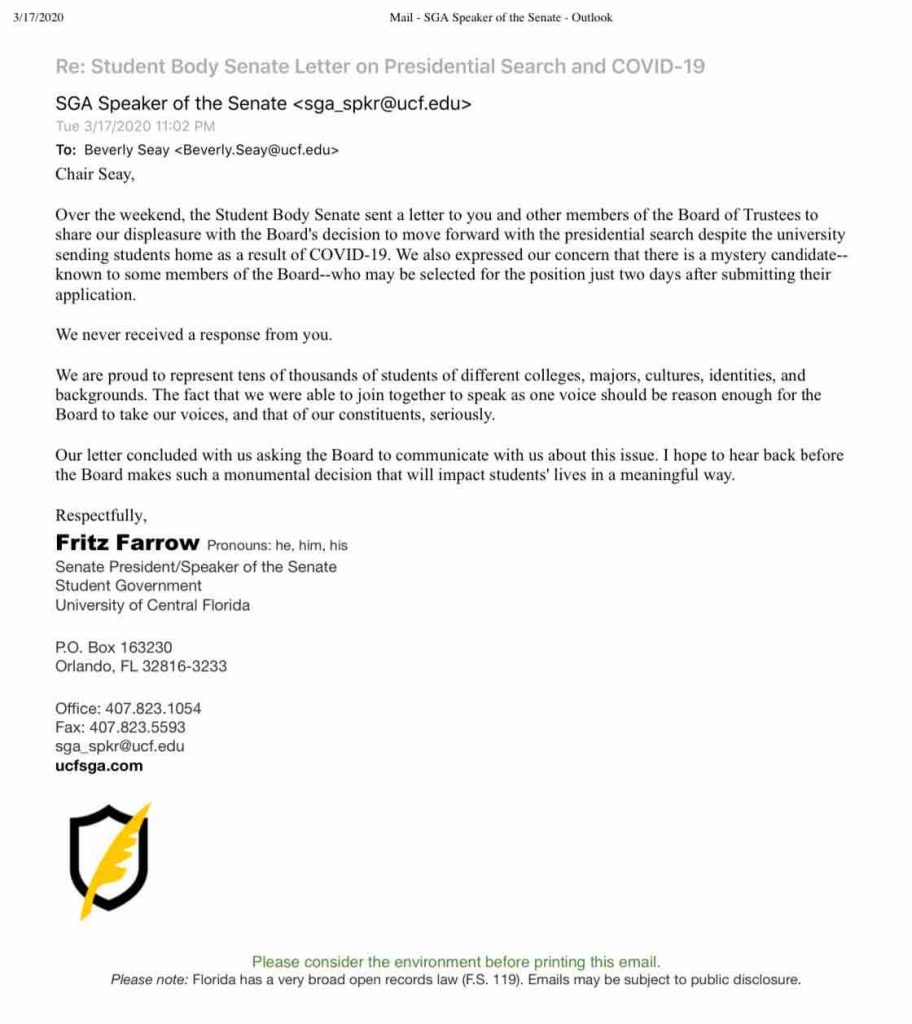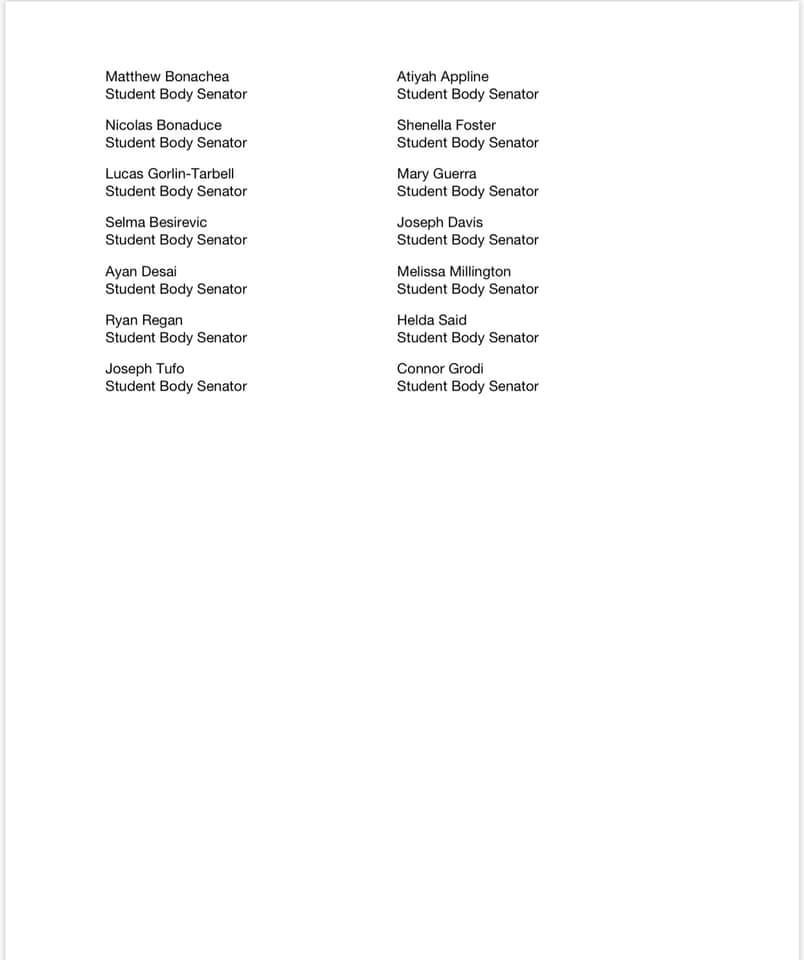The mystery candidate in UCF’s search for its sixth president may have the deck stacked in his favor, and an expert in open government said it raises concerns and questions into the integrity of the entire search process.
Just 48 hours before the Board of Trustees is set to select UCF’s sixth president, the third candidate’s information was made public.
Alexander Cartwright, chancellor of the University of Missouri, is the candidate UCF’s search firm referred to as “an individual we’ve been hoarding for many, many weeks now, ” and a “high visibility individual,” during a March 13 emergency Board of Trustees teleconference meeting.
Dr. David Brenner — a top-three finalist announced on March 5 — withdrew after the Presidential Search Committee interviewed Cartwright and voted to add him as the third candidate on Wednesday.
Frank LoMonte, director of the Brechner Center for Freedom of Information at the University of Florida, said picking an individual in a closed process and preventing the release of the mystery candidate’s records tells the UCF community their voices do not matter.
LoMonte’s comments come as one UCF professor started a petition to stop the vote from happening.
Stephen Fiore, a professor in the Department of Philosophy, said he started a petition as an example of the frustration the faculty feel in response to a rushed presidential search.
The petition, which was started on Tuesday, has nearly 100 signatures at time of publication.
“In general, I was not pleased with the applicant pool for a university of our size and complexity,” Fiore said. “Then, when the one candidate withdrew, and the committee stated they still planned to move forward, that was even more troubling. Add to that the mention of a third mystery candidate, and the whole search process became too concerning.”
Fiore said the “proverbial straw” was when the Presidential Search Committee sent an email update informing the community of its plan to stick to the schedule despite the COVID-19 pandemic, and an inability for full participation by faculty and students.
“I started the petition so there could be some record that the community felt there was no need to rush such an important decision that would affect, not only UCF, but also the region and the state,” he said.
The petition states there is no significant harm that would come from a delay in the decision, and making a decision in haste would have problems for years to come.
This theme was also represented in the Student Government Senate letter sent to the Board of Trustees on Saturday.
UCF SG Senate President Fritz Farrow — and 30 SG senators — voiced their disappointment in a written letter on Saturday to UCF’s Board of Trustees.
“Our displeasure with these developments is born out of our belief that students should have the opportunity to vet these candidates and have in-person interactions with them,” the letter reads. “These interactions are crucial to allowing students to communicate with the finalists interpersonally …”
UCF SG President Kyler Gray said on Sunday that students have been at the forefront of the search since day one, but Farrow said no Trustees responded as of Tuesday to his letter sent on behalf of the senate.
The senate expressed the disappointment and lack of judgment the university has displayed by allowing the search to continue in secrecy.
“When you pick someone in a closed process where only a handful of trustees have had any involvement, you’re telling the students their voice doesn’t matter,” LoMonte said. “You’re showing them that you disrespect their voice.”
Farrow said he followed up with a secondary email to the Board of Trustees Tuesday evening.

LoMonte, the previous executive director of the Student Press Law Center, said the search firm is a private company hired to perform some of UCF’s job duties on behalf of the university.
He said the firm performs the same functions the university would, like searching and hiring, and the roles can not be made private despite the firm taking over the duties.
“There are interpretations of open government laws that say when you hire a private organization, like a search firm, to do governmental business and conduct a governmental service, they must disclose their records,” LoMonte said. “You can’t privatize a governmental function and take it out from under the Sunshine just by handing it off to a private contractor.”
Search firm consultant Alberto Pimentel confirmed the mystery candidate was interested in the position on Monday and jumped to defend the individual and the lack of records produced, after mentioning the mystery candidate was still preparing the materials and implying the candidate was dealing with COVID-19 at Mizzou.
“He is very dedicated to his current institution and has a tremendous obligation,” Pimentel said on Monday. “So he really needed time to think about how he could possibly extract himself from that situation and from the university in a way that was respectful …”
LoMonte said Vistasp Karbhari — the former top three finalist who withdrew his name from the search when baggage from his home institution was brought to light — is the reason open searches are necessary.
“Karbhari is exactly why you do the searches in an open process because by floating the person’s name as a candidate, the baggage that they had at their prior job came to public attention and the person was forced to withdraw,” LoMonte said.
He said that is the single greatest danger with doing these searches secretly.
Karbhari was advanced from a pool of 45 candidates to a group of seven on March 3, and then to the top three finalists on March 5, despite the committee’s knowledge of the allegations and lawsuit before allowing him to proceed in the ranks.
He resigned from the University of Texas at Arlington on March 4 and eventually withdrew his name from the search on March 9 — six days after his on-campus interview.
UCF spokesman Chad Binette said in a Monday email the mystery candidate had been recruited since early in the presidential process.
That recruitment has included one-on-one conversations with several search committee members, including the Faculty Senate Chair and Board of Trustee William Self, Binette said.
Binette said records did not exist before Wednesday.
LoMonte said the search firm, search committee and the trustees have dealt with the public so dishonestly, the UCF community should distrust everything they do at this point.
“You really have to ask yourself if this whole entire process has not been built from the start,” LoMonte said. “They put a person like Karbhari into the mix, having a pretty good idea that person was not a suitable candidate, it’s almost like they purposefully went out of their way to pick a weak field so that the lane would be clear for the secret candidate.”
In a Wednesday email, the mystery candidate’s identity was revealed.
Cartwright — who has held the executive position at Mizzou since 2017 — is the only individual of the three finalists to hold a top leadership position at a university.
“There are serious questions about the integrity of this search at this point,” LoMonte said. “I think members of the community should be asking for a do-over.”
This article has been updated to include information regarding Dr. David Brenner’s withdrawal from the search.







